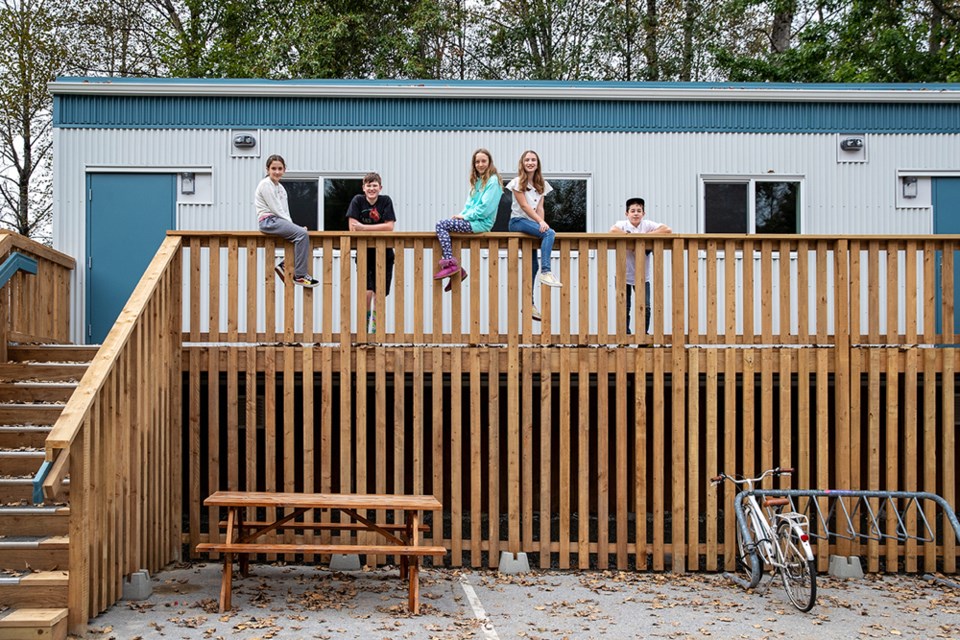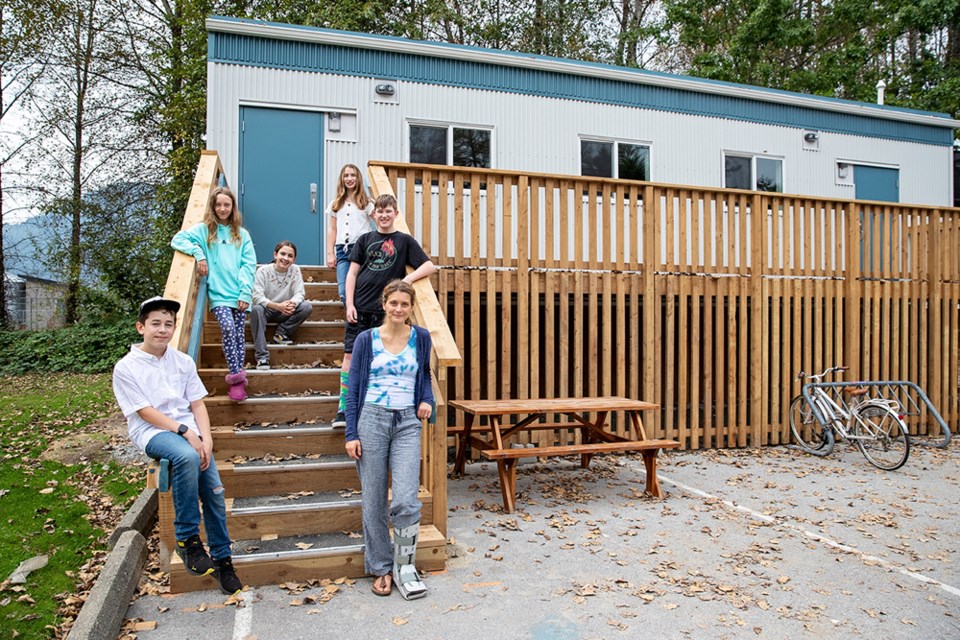Squamish student Charlotte Gadbois-Schuett, 12, says she can envision a time when there will be so many students attending her francophone school that it will be housed in a "huge" building.
Gadbois-Schuett is in Grade 7 at École Les Aiglons, where she has been from the start.
The school recently expanded its curriculum to offer a new Middle Years program.
The first group of this new program began in September and was made up of four Grade 7 students and one Grade 8.
"This September marks a new milestone in their growth with the opening of their eighth classroom and a new middle school program in a school with over 130. students from K to 8 now," said parent Christine McLeod, whose daughter Ali is in Grade 7 at the school.
Traditionally, students would transfer to Don Ross Middle school where grades 7, 8 and 9 are offered.
École Les Aiglons opened in Squamish in Sept 1996 with 10 students from kindergarten to Grade 5, in a single classroom at Mamquam Elementary.
The number of students continued to increase. École Les Aiglons set up in its current home in the former Capilano University building next to Howe Sound Secondary in 2015.
The vision is to have a K to 12 francophone school, McLeod said, adding "several of them in the corridor."
"People often ask: What is the difference between French immersion and the francophone school?' and 'Why can't any child go to Ecole Les Aiglons if they want to?'" McLeod told The Chief in an email.
"The answer lies in Section 23 of the Canadian Charter of Rights and Freedoms, which guarantees that citizens of Canada whose first language learned and still understood is that of the English or French linguistic minority population of the province in which they reside — in our B.C. case that would be French — have the right to have their children receive primary and secondary school instruction in that language in that province."
One or more of the parents in the students' homes have French as their first language, in other words.
McLeod notes that Squamish's francophone population has grown in the last 15 to 20 years.
Between the 2006 and 2016 census, the number of people in Squamish identifying French as their mother tongue doubled and the number of families speaking both French and English at home grew by almost 60%.
"I think it is a good program that they started," Gadbois-Schuett said, of the middle school classes. "And I think it is really going to impact the future of French schools."
For Gadbois-Schuett, a big advantage of the program is the smaller class size.
"It is kind of easier to concentrate and I love my teacher," she said of the cohort's teacher Lucie Lhotak.
During COVID-19 the small class sizes are a plus, too, McLeod agreed, as there is less worry about lots of children mixing in a class.
But there are trade-offs to being the first groups and being in smaller classes, Gadbois-Schuett and McLeod acknowledge.
"It is kind of challenging when you want to play sports, or something like that — or teams — there are not enough people," said Gadbois-Schuett, adding she finds sometimes kids outside the school also don't really get what it is about.
"They don't really understand the fact that there are only five people in the class and they don't really understand the language. But it is different. They have been in classes of 30, and I have never been in a class of 30 — ever. The highest class I have ever been in was probably 20."
McLeod said it took "courage" to be the first students of the new program when many of their classmates switched to Don Ross for middle school.
"It isn't necessary, at 11 or 12 years old, the popular decision to stay when everybody heads off to the middle school and people have a picture in their minds of what middle school is," she said.
"In most cases, it was driven in concert between the parents and the kids, because the kids recognized either personality-wise, a small school was a better fit for them, or they wanted to be the leaders, to be the oldest — and there are tremendous leadership opportunities for these kids at this age to be the big kids in the school."
While the school doesn't have the big school trappings of a science lab, school gym, or sports teams, the school district — which is part of Conseil Scolaire Francophone de la Colombie-Britannique (CSF)— is creative and allows for options for the small school, for example, they have a robotics program and sewing machines in the classroom.
"Specifically, for this group of kids, it is tough to be the first ones sometimes. I don't think it will be as tough going forward," McLeod added.
Attending a francophone school is more than just being educated in French, those The Chief interviewed said. It is a culture and a bridge to French-speaking family members.
Gadbois-Schuett said her favourite cultural event at school is the Cabane à Sucre celebration.
"We go to the Callaghan and we have maple syrup on sticks and we sing a whole bunch of French songs — and I have been doing that since kindergarten."
Gadbois-Schuett's mom is francophone as is the rest of her mom's family, she explained. "My dad, he understands French, but he doesn't speak it and his family is not francophone."
Gadbois-Schuett learned to speak French before English, she said and converses with her French relatives.
French is McLeod's first language and she speaks only French with her mother.
"But being married to an anglophone in British Columbia and my kids speaking English, that sense of connection to that dual identity is they speak French with their grandmother, we go back to Quebec.... It is not just the language, it is the culture piece. For some people in the Francophone school, it is really neat to have their kids be able to converse with francophone grandparents and cousins and aunts and uncles that they may not necessarily have had the chance to connect in that culture-way."
Indigenous influence
Roger Lagassé, a school trustee representing the Sunshine Coast and Sea to Sky with CSF, which provides French education programs and services in B.C., said that Aboriginal and French education have a long history together.
The district is now working on its third Aboriginal Education Enhancement Agreement. The first was in 2009.
"There's a great connection between francophones in Canada and Indigenous people," said Lagassé.
"It goes way back 400 years and actually goes back 10,000 years because a lot of French Canadians have some Aboriginal ancestry — probably most.... It is a very rich subject to deal with," he said. "There's lots of stories and culture to be accessed there for kids. So, it is something that the CSF, the school district, really cherishes and promotes."
Lagassé said it is an exciting time for French education with the integration and celebration of Aboriginal teachings and ancestry.
There are currently 10 First Nations students at Les Aiglons.
For more on the school, go to https://aiglons.csf.bc.ca/.




